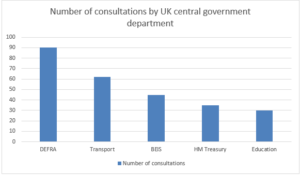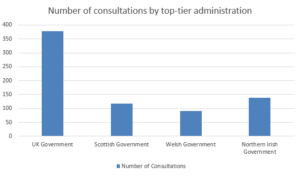News & Insights
Government Consultations- 2019 Retrospective
For a number of years the Consultation Institute has been gathering data on government consultations from around Great Britain and Northern Ireland. Looking at both the UK government and the devolved administrations we can now summarise that data for 2019. Putting all top-tier administrations together the number stands at 725 in 2019, a number which hopefully demonstrates a continuing commitment to the principles of consultation and public engagement.
In total, the UK central government conducted 379 consultations. Dealing with them on a department-by-department basis (including consultations undertaken by their subsidiary public bodies) the department most involved in consultations was the Department for the Environment, Food and Rural Affairs by far with a total of 90 ranging from microchipping cats to food allergen labelling. Following on from DEFRA was the Department for Transport at 62. In order, the top five consulting departments in the UK Government were:
- Department for Environment, Food and Rural Affairs (90)
- Department for Transport (62)
- Department of Business, Energy, Industry and Skills (45)
- HM Treasury (35)
- Department of Education (30)
DEFRA’s undeniable dominance in consultations is boosted considerably by their supervision of both Natural England and the Maritime Management Organisation, both of whom consult regularly on open access restrictions and catch limits respectively. If we filter out those consultations then they slip a little into third place in our table.
Nine UK central government departments conducted no consultations, mostly the smaller departments such as the Attorney-General’s Office and the Offices of the Leaders of both Houses. Only three of the larger departments fell under this category, those being the Department for Exiting the European Union, the Foreign and Commonwealth Office and the Department for International Development. All relatively unsurprising given their remits. Excluding these, and the UK government offices for Scotland and Wales, the bottom five consulting departments were:
- Department for International Trade (1)
- Northern Ireland Office (3)
- Cabinet Office (5)
- Ministry of Justice (7)
- Ministry of Defence (9)
Of the devolved administrations, perhaps surprisingly, Northern Ireland took the top spot, the absence of the Stormont assembly not preventing them from running 139 individual consultations. The vast majority however were functional consultations on road closures and secondary legislation, with the primary subject matter being environmental affairs. With the return of the Stormont Assembly and the power-sharing agreement, it will be interesting to see how many they do in the next year. It is possible of course that their 2019 numbers were bolstered by civil servants and officials judiciously consulting on potentially controversial, yet important matters that should preferably be dealt with by politicians. Also of note with regard to Northern Ireland were the three consultations undertaken by the Northern Ireland Office of the UK government (included in the UK figures). Two of these consultations on potentially politically difficult subjects, one on abortion services in Northern Ireland and the other on compensation for victims of the Troubles have drawn some attention and ire in Parliament from Northern Irish politicians protesting what they see as the usurpation of their legislative rights by the UK government on the basis of flawed consultations.
The Scottish government consulted 117 times, 25 of them being related to justice or the administration of Scots law. Other major Scottish consultations came over institutional changes, in particular the creation of a ‘Public Health Scotland’ body, to be established in April of this year. Both the environment and housing also seem prominent in the minds of Scottish ministers, both coming in at 19 consultations each. One thing we particularly noted about the Scottish consultations was how many major changes are presently being consulted upon. Apart from the Public Health Scotland consultation and a major consultation on the corporate plan of the new Scottish Forestry body, major consultations on the reform of Scottish charity law, housing and children’s issues promise significant movement in the Scottish Parliament over the next couple of years.
The pre-eminence of environmental issues continues with the Welsh government with nearly a fifth of its 91 consultations being related to environmental concerns (18). Education also formed a major volume of the Welsh consultations with 17 revolving around schools’ provision and general changes to education regulations. Quite a few of the Welsh consultations seem to relate to food supply matters including two related to Brexit (on updating Welsh food law and supporting farmers.
So what does all this data show us? Here at the Institute, we are somewhat encouraged by what seems to have been another year of Government departments reaching out to the general public in this way. There is however much work to be done to ensure that all of these consultations are up to best practice standards going forward. As we always say- more consultations is not always a good thing if they are not up to scratch. It remains to be substantively seen what attitude a Boris Johnson-led government with a significant majority will have towards public engagement and consultation and we can but hope that he will continue to consult where appropriate. Certainly, his first Queen’s Speech from 19th December 2019 seems to presage a significant number of prominent consultations on major issues. It will also be interesting to see whether the increased public focus on the environment brought about by a more activist society will have any notable impact on government enthusiasm towards consulting on environmental issues particularly in more controversial sectors.
One of the things that did surprise us were how few directly-Brexit related consultations seemed to have been undertaken last year. Whether that was because Brexit was still being talked about last year as merely a probability, or because the respective governments still did not know what shape Brexit would take is difficult to tell. With Boris Johnson newly invigorated and Brexit now a certainty, it will be interesting to see how many consultations we get as a result of powers returning from Europe. We would expect quite a lot, however as the government has been attempting to reserve many regulatory powers to itself throughout the Brexit process, this may not necessarily come about.
For the devolved administrations, consultations will continue to play a large part in their relationships with their citizens. A renewed Stormont Assembly now that a power-sharing deal has been reached may well lead to a proliferation of consultations in Northern Ireland as the new government finds its feet and begins to work out a legislative programme.
This Data is compiled from published government sources. However, we are aware of discrepancies such as warrant a degree of caution about the precise figures. For 2020 we are introducing higher standards and more checks!
If you would like any further information or have any more specific questions, then do drop us a line at either stephenh@consultationinstitute.org or sarahj@consultationinstitute.org.





